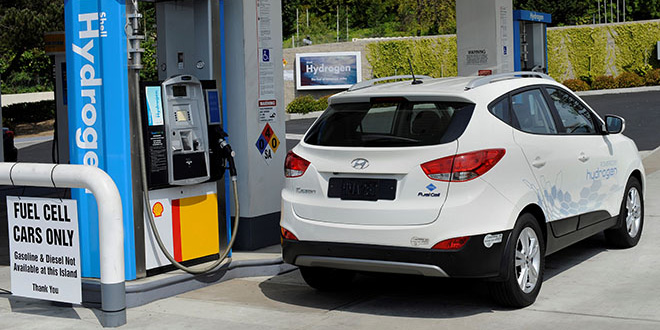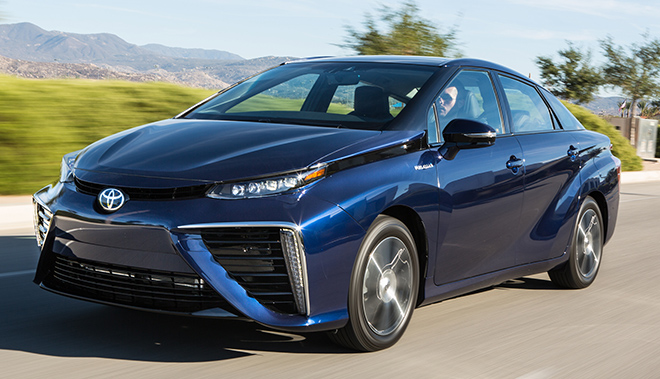The debate over fuel cells rages on. Many in the EV industry, most prominently Elon Musk, have explained at eloquent length why hydrogen fuel cells are inferior to batteries for automotive applications. Others however, especially in Japan, do not agree.
The main proponent is Toyota, which has been selling the Mirai fuel cell vehicle since late 2014, and hopes to be selling 30,000 hydrogen vehicles per year by 2020. To date, it has sold about 2,840 in Japan, California, Europe and the United Arab Emirates.
The company was recently forced to recall the entire fleet of Mirais to fix a problem with the output voltage of the fuel cell system, Reuters reports. Toyota said that under certain conditions, the output voltage generated by the fuel cell boost converter could exceed the maximum voltage.
Many other automakers continue to experiment with fuel cells. Honda introduced the Clarity Fuel Cell sedan in December, and Hyundai offers the Tucson Fuel Cell SUV. Lexus and Audi showed hydrogen concept cars at the recent Detroit auto show.

GM and Honda have announced a joint venture to develop fuel cell systems. The companies plan to invest $85 million in the venture, and hope to reach production in 2020.
Fuel cells are also being tested for heavier vehicles. Loop Energy recently introduced a fuel cell-based range extender for heavy-duty EVs. A train that uses both fuel cells and batteries, built by Alstom, is in pilot service in Germany.
The highest hopes for hydrogen, however, are to be found in Japan, where it is seen not only as a transportation technology, but also as a stationary storage medium for residential and industrial applications.
The city of Tokyo plans to invest $400 million in vehicle subsidies and fueling stations to showcase hydrogen tech at the 2020 Olympic Games. Toyota hopes to have 100 fuel cell buses operating in the nation’s capital by then.
Prime Minister Shinzo Abe is an advocate. “Hydrogen energy is an ace in the hole for energy security and measures against global warming,” he said in January. “Thanks to deregulation, a hydrogen society of the future is about to begin here in Japan.”
“Hydrogen is the fuel of the future – and always will be,” say detractors. The arguments against fuel cells are technical, and thus are seldom discussed in the mainstream press. Hydrogen is not a source of energy, but a means of storing energy, an alternative to batteries. Fuel cell vehicles (FCVs) are electric vehicles – they use the same electric motors and other powertrain components that battery electric vehicles (BEVs) do – only the energy storage medium is different.
FCVs currently have two advantages over BEVs: they have more range, because a tank of hydrogen can store more energy than today’s typical EV battery; and they can be refueled quickly, like a legacy ICE vehicle. However, as the energy density of batteries improves, the range issue will fade away. As BEV ranges increase, charging speeds are also on the rise, and new technologies such as automatic wireless charging and/or dynamic wireless charging may someday make the charging issue irrelevant.
Back in 2003, when Martin Eberhard and Marc Tarpenning were laying their plans to create Tesla Motors, they considered many different energy storage mechanisms, including hydrogen, before deciding that batteries were the best choice. “Hydrogen is an energy carrier, not a primary fuel,” noted Tarpenning, “and unfortunately, it’s not a good energy carrier.”
In 2014, Green Car Reports published a list of questions for Hyundai, Toyota, and Honda about the viability of fuel cells. To their credit, the automakers responded. In January, Business Insider restated the advantages of FCVs in range and refueling time.
Elon Musk has explained the shortcomings of what he calls “fool cells” many times. As a storage mechanism, hydrogen is less efficient than Li-ion batteries (to say nothing of future battery chemistries). Storing and transporting hydrogen are challenging, and using it in cars would require building a network of fueling stations, whereas the electricity to charge a BEV is already available at the nearest wall outlet.
“If you’re going to pick an energy storage mechanism, hydrogen is an incredibly dumb one to pick – you should just pick methane, that’s much much easier, or propane,” said Elon Musk at the Automotive World News Congress in 2015. He went on to explain the complexity of producing hydrogen. “It’s just very difficult to make hydrogen and store it and use it in a car. If you, say, took a solar panel and use that…to just charge a battery pack directly, compared to split water, take hydrogen, dump oxygen, compress hydrogen…it is about half the efficiency.”
Sources: Bloomberg, CNET, Reuters, Green Car Reports, Business Insider




















































